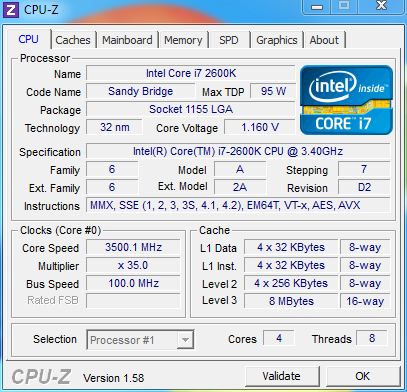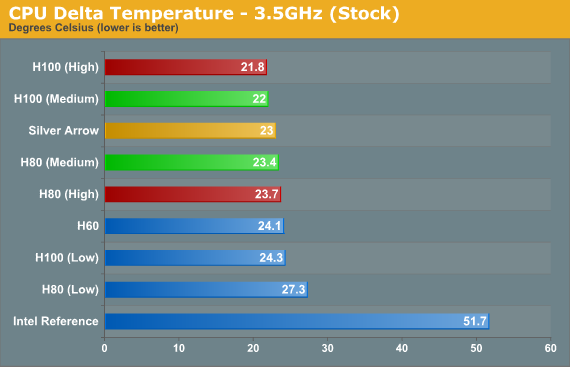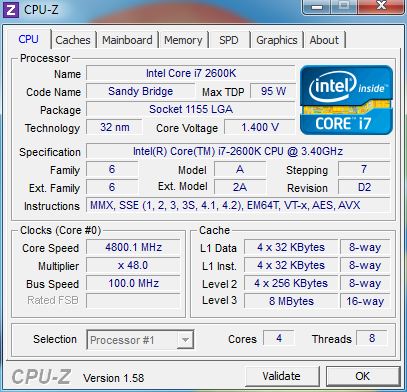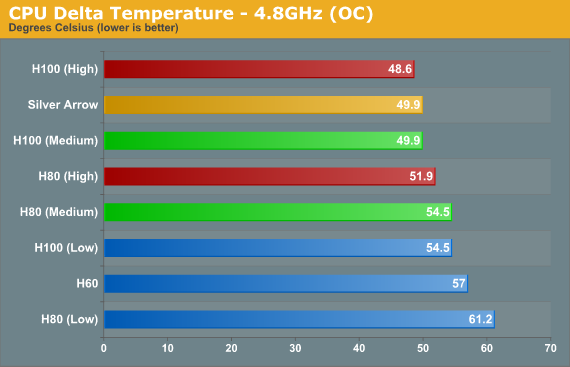Corsair Hydro Series: H60, H80 and H100 Reviewed
by Jared Bell on November 7, 2011 12:00 AM EST- Posted in
- Cases/Cooling/PSUs
- Corsair
- Water Cooling
Temperature Results
Each Corsair Hydro Series cooler is mounted to blow air from outside the case over the radiator. We had to leave the top cover off of our 600T chassis during the H100 tests due to its restrictive design; otherwise the H100 results would have been horrendously skewed. The top cover didn't affect our other tests and was left on for those. Since the H60 has a PWM fan, we disabled any BIOS fan controls to ensure the fan was spinning at 100%. All three of the H80 and H100 speed settings are tested. We’ll start with our stock 3.5GHz test results and then move to the overclocked results.


The stock speed test doesn't provide much of a challenge for any of the Hydro Series coolers, leaving very little gap between them. Not surprisingly, all of the aftermarket coolers simply crush the stock Intel cooler; however, it’s also worth nothing that the Silver Arrow outperforms both the H60 and H80, and nips at the heels of the H100 set to Medium fan speed. Due to the relativity cool temperatures during this test, some of the speed profiles for the H80 and H100 never hit their maximum RPM. This keeps those coolers relatively quiet even when running on high or medium at stock speeds.


Now that we're overclocked to 4.8GHz, these coolers are finally showing a temperature difference worthy of their price difference. Also note that the stock Intel cooler didn’t handle the 4.8GHz load reliably, so we don’t have results for it in this chart. The H100 is the runaway leader here, sporting a comfortable 3.3C lead over the H80. The H60 falls 5.1C shy of the H80—not terrible considering its slimmer radiator and single fan design. The cooling advantage of the H100 on the high setting does come at a penalty though; it's substantially louder as you'll see next in the noise test. The potential spoiler in the midst of these results is the Silver Arrow, once again coming very close to the H100 at a lower price. It’s not without compromises, which we’ll cover in the conclusion.










91 Comments
View All Comments
Mjello - Monday, November 7, 2011 - link
Mine is the old version with the bulky cooler/pump unit. May even be other make. I dont remember and don't care to open the computer to check. However its a dual 120mm fan radiator in a closed loop ready to use. Just as this one. And I don't think there is much diff. if any at all ;). I actually thought mine was the h100.Gonemad - Monday, November 7, 2011 - link
I am a bit concerned about systems that consider the placement of the Fan on top of the CPU to cool everything else around it, like the ram, and so forth. This radiator installation inside the case seems to help this unease feeling.Mjello - Monday, November 7, 2011 - link
I found that the power supply fan alone is creating sufficient airflow in the kabinet for cooling the motherboard components when there is no cpu fan. But I dont overclock in the extreme. And motherboards are not all the same.Oberst - Monday, November 7, 2011 - link
Hello,could you please also post the dimensions of the cooling unit (cooler, pump unit, fan controller)?
That would be quite interesting for people mounting the radiator externally and putting the cooling unit through a fan hole ore something similar into the case onto the mainboard.
As the price difference in Europe between the H80 and H100 is quite low (only about 9 Euros), i'm interested in upgrading my quite old case with a external mounted H100.
k.r. Oberst.
haplo602 - Monday, November 7, 2011 - link
I have a dual CPU system with 92mm coolers (no space for larger ones). However the case has holes on top for 2x140mm fans. Would to H60 radiators fit there next to each other ?I know I can do a better and cheaper open loop with one radiator and the CPU waterblocks in series, but I like the idea of cooling both CPUs as they needed and not as the more loaded one needs.
geniekid - Monday, November 7, 2011 - link
This is definitely a niche product, even for enthusiasts. One of the biggest selling points of water cooling is to reduce fan noise, but it looks like the fans on these things aren't much quieter than the stock fan for low load usage (i.e. normal HTPC use). For gaming machines, the biggest noise offenders (in my anecdotal, personal experience) are usually the GPU and the power supply fans.Maybe if your goal is to overclock as much as possible with a cooling solution around $100, then this is for you, but I would have to see many more comparisons to air coolers and alternative water coolers before I'd be convinced of that.
kg4icg - Monday, November 7, 2011 - link
Have no problems what so ever mounting the H100 inside a Corsair Carbide 400R case. 500 and 600 Carbides are the same way.[IMG]http://i445.photobucket.com/albums/qq175/kg4icg/te...[/IMG]
WT - Monday, November 7, 2011 - link
I bought an H80 for my new build to cut down on the noise that my current air cooler (Nirvana NV120) created, and to that end it is an amazing difference, so I consider it a worthwhile purchase for what I wanted.As far as the directions, I agree that they are pitiful, and I even had to do a google search (Corsair tech support hours = Mon-Fri) to find out where the 4 included washers were to be mounted.
I did end up replacing the 2 stock Corsair fans with Gentle Typhoon AP-15's, and I mounted them so that they blow out of the case rather than pulling air from outside as Corsair recommends.
Beenthere - Monday, November 7, 2011 - link
There are plenty of quiet HSFs that perform as well or better than the Corsair CLCs and cost less. Having to spend more moeny for quiet fans makes a Corsair CLC an even worse value. The biggest liability with H2O cooling however is the damaged from leaks that can destroy hundreds of dollars in PC hardware and for what when there is no advantage to a Corsair CLC.Buy what makes you happy but don't buy the Corsair or other brands of CLCs for thermal efficiency, quietness, value or reliability because they suffer in these areas compared to a decent HSF.
pcfxer - Monday, November 7, 2011 - link
And yet liquid cooling is still FAR too loud for any SPCR reader, that's for sure!